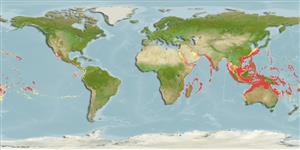sub class Elasmobranchii (ฉลามและกระเบน) (sharks and rays) >
Carcharhiniformes (Ground sharks) >
Carcharhinidae (Requiem sharks)
Etymology: Carcharhinus: karcharos (Gr.), sharp or jagged; rhinus, an ancient name for sharks, from rhine (Gr.), rasp, both words alluding to a shark's jagged, rasp-like skin. (See ETYFish); albimarginatus: albus (L.), white; marginatus (L.), bordered, referring to white fin tips. (See ETYFish).
More on author: Rüppell.
Environment: milieu / climate zone / depth range / distribution range
นิเวศวิทยา
เกี่ยวกับทะเล,น้ำเค็ม เกี่ยวกับหินโสโครก; ระดับความลึก 1 - 800 m (Ref. 6871), usually 20 - ? m (Ref. 30874). Tropical; 32°N - 31°S, 31°E - 77°W (Ref. 55177)
Indo-Pacific: Red Sea and East Africa, including Madagascar, Seychelles, Aldabra Group, Mauritius and the Chagos Archipelago east to Tuamotu Is., north to Japan and south to Australia (Ref. 244). Not confirmed in west Atlantic (Ref. 58085).
Length at first maturity / ขนาด / น้ำหนัก / Age
Maturity: Lm 187.3, range 160 - 200 cm
Max length : 300 cm TL เพศผู้/กระเทย; (Ref. 2334); common length : 200 cm NG เพศผู้/กระเทย; (Ref. 30874); น้ำหนักสูงสุดที่มีการรายงาน: 162.2 kg (Ref. 40637)
เงี่ยงครีบหลัง (รวม): 0; ก้านครีบอ่อนที่หาง (รวม): 0; เงี่ยงครีบก้น 0; ก้านครีบอ่อนที่ก้น: 0. First dorsal fin and pectoral fins angular, and not expanded; upper teeth triangular; interdorsal ridge present (Ref. 1602, 5578). Dark grey or grey-brown above, white below; all fins with conspicuous white tips and posterior margins (Ref. 9997).
An inshore and offshore shark found over or adjacent to continental and insular shelves and offshore banks (Ref. 244). Prefers offshore islands, coral reefs and banks (Ref. 244). Benthopelagic (Ref. 58302). Feeds mainly on benthic and midwater fishes (including scombrids), also rays, cephalopods (Ref. 244, 1602), and small sharks and crustaceans (Ref. 89972). Viviparous (Ref. 50449). Up to 11 young, size 50 to 60 cm, are born after a gestation period of 12 months (Ref. 1602, 37816). Potentially dangerous (Ref. 9997). Presumably taken by fisheries in areas where it occurs (Ref. 9997). Caught irregularly by shark and tuna longline and tuna gillnet fisheries. Utilized for its fins (high value in adults), meat, skin and cartilage (Ref.58048). Probably utilized fresh and dried-salted for human consumption (Ref. 9997).
Viviparous, placental (Ref. 50449). With 1 to 11 pups per litter (usually 5 or 6) (Ref. 244). Gestation period is about one year, young are born in summer (Ref. 244). Size at birth 55 to 80 cm (Ref. 2334); 713-81 cm TL (Ref.58048). In southern hemisphere, both breeding and pupping occur in summer (Ref. 37816). Distinct pairing with embrace (Ref. 205).
Compagno, L.J.V., 1984. FAO Species Catalogue. Vol. 4. Sharks of the world. An annotated and illustrated catalogue of shark species known to date. Part 2 - Carcharhiniformes. FAO Fish. Synop. 125(4/2):251-655. Rome: FAO. (Ref. 244)
IUCN Red List Status (Ref. 130435)
Threat to humans
Traumatogenic (Ref. 4690)
Human uses
การประมง: การค้า; การตกปลาเป็นกีฬา: ใช่
ข้อมูลเพิ่มเติม
อ้างอิงการเพาะเลี้ยงสัตว์น้ำประวัติการเพาะเลี้ยงสัตว์น้ำสายพันธุ์พันธุศาสตร์ElectrophoresesอัตราพันธุกรรมโรคการแปรรูปNutrientsMass conversion
เครื่องมือ
Special reports
Download XML
แหล่งที่มาจากอินเตอร์เน็ต
Estimates based on models
Preferred temperature (Ref.
123201): 13.9 - 29, mean 27.1 °C (based on 4094 cells).
Phylogenetic diversity index (Ref.
82804): PD
50 = 0.5000 [Uniqueness, from 0.5 = low to 2.0 = high].
Bayesian length-weight: a=0.00437 (0.00215 - 0.00887), b=3.09 (2.92 - 3.26), in cm total length, based on LWR estimates for this species & Genus-body shape (Ref.
93245).
ระดับชั้นอาหาร (Ref.
69278): 4.2 ±0.5 se; based on diet studies.
ความสามารถในการกลับคืนสู่ปกติ (Ref.
120179): ต่ำมาก, เวลาต่ำสุดที่จะทำให้ประชากรเพิ่มขึ้นเป็น 2 เท่าใช้เวลามากกว่า 14 ปี (Fec=1).
Fishing Vulnerability (Ref.
59153): Very high vulnerability (90 of 100).
Nutrients (Ref.
124155): Calcium = 4.53 [0.96, 23.65] mg/100g; Iron = 0.345 [0.087, 0.987] mg/100g; Protein = 22 [19, 24] %; Omega3 = 0.116 [0.047, 0.277] g/100g; Selenium = 55 [16, 154] μg/100g; VitaminA = 40.5 [15.2, 111.1] μg/100g; Zinc = 0.488 [0.233, 0.953] mg/100g (wet weight);
